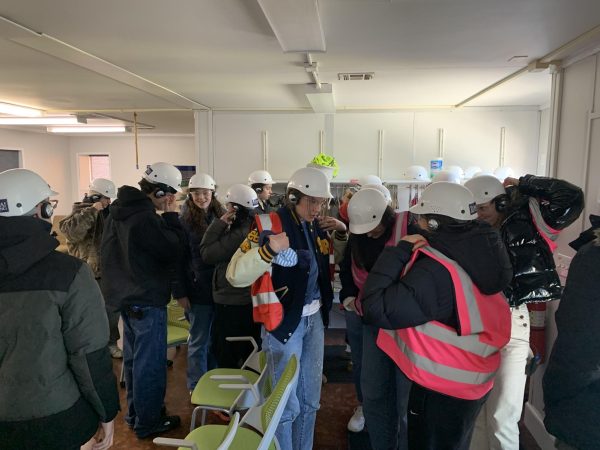On Tuesday, the Environmental Science class went on a field trip to the Eureka Recycling Plant in Minneapolis.
The Environmental Science class is a semester-long course covering the causes and effects of climate change on the Earth. After wrapping up their projects on alternative energy, they diverted to a short unit about recycling, seeing the process up close at the Eureka Plant.
Environmental Science teacher Rachel Yost-Dubrow explained, “My biggest hope is that by seeing it firsthand, students first really understand what can and can’t be recycled and how to sort things and also understand why it’s so important to do that.”
The plant receives several tons of recycling every day from across the Twin Cities and sorts through all the materials. The first step of the sorting process is removing accidentally placed trash and items made from non-recyclable plastic. For example, a specific type of black plastic has to be sorted out because once the material is dyed, it can’t be undone and reused. In the second step, recyclables are sorted by the size and material they’re made of. Senior Wafa Naqvi recounts, “They have these machines that sort everything through size, and then there’s an electric current that shoots aluminum cans up and then the rest of the trash down.” The four main groups the recycling gets separated into are paper, cardboard, cans and plastic.

Most of the sorting is done with machines and conveyor belts, but workers will also help out in the process by picking out pieces individually that are too bulky for the machinery. After the recyclables are correctly sorted, the materials are packaged into rectangular bales and sold to different manufacturers to reuse and make new appliances or objects.
For Naqvi, the most exciting part of the field trip was seeing the engineering and technical side behind all the different machines and conveyor belts working together. Their guide also mentioned that Minnesota is currently the seventh-best in the nation at recycling. Minnesota is also among the top few without a bottle bill, meaning there is no monetary incentive to recycle cans and bottles, but many individuals in the state still choose to. “Minnesota has really good recycling, which was really cool to see,” Naqvi said.
The guide who toured the class also shared a few recycling tips. Firstly, don’t crush your cans or bottles because it can mess with the machine sorting by size. Secondly, keep bottle caps on when recycling because it helps the machinery recognize different materials and shapes. These small tips can make a recycling center’s job infinitely easier.
My biggest hope is that by seeing it firsthand, students first really understand what can and can’t be recycled and how to sort things and also understand why it’s so important to do that.
— Rachel Yost-Dubrow
Visiting the Eureka Plant is the fifth and final field trip of the semester-long class. Previous excursions have included trips to the Hmong American Farmers Association, Wildlife Science Center, outdoor drawing and more. “I think for a class called Environmental Science, it makes more sense to be outside when possible,” Yost-Dubrow said. “Because if we’re talking about the outdoors, the best way to learn from it is actually being outside.”
The class also covers many different topics relating to the environment and plans multiple projects around collecting data outside and seeing nature in action. “I think for anyone that’s even like remotely interested in [environmental science] it’s definitely super beneficial,” Naqvi said.